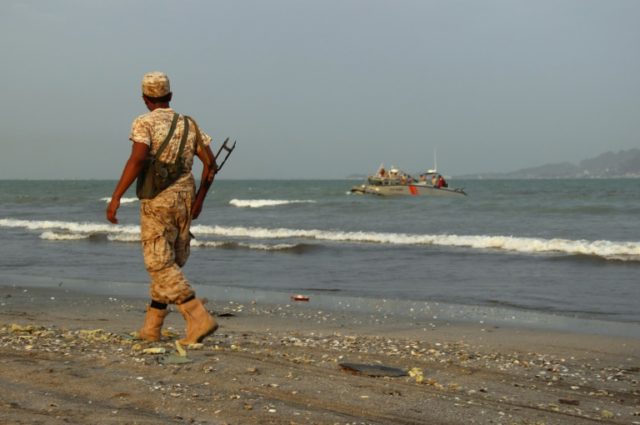The U.S. military has reportedly intensified its assistance to the Saudi-led coalition in Yemen, providing the United Arab Emirates (UAE) with intelligence to improve the accuracy of airstrikes against the Iranian-backed Houthi rebels in the port city of Hodeida that began Wednesday.
Referring to American military efforts, an unnamed U.S. military official told the Wall Street Journal (WSJ), “The intent [of the U.S. increased role] is to minimize the number of civilian casualties and the harm to critical infrastructure.”
While the United States is helping its Gulf allies fine-tune, the United Nations has warned against the UAE on Yemen’s most important port in the Red Sea, considered the main entry point for food in the Middle East’s most impoverished country that is already in the grip of a famine.
The U.N. warns that an attack on the port city of Hodeida could further worsen the humanitarian crisis already gripping the country, derail renewed efforts to broker a peace deal, and kill up to 250,000 more people.
However, Yemen’s internationally recognized government declared Tuesday night that negotiations had failed to force the Houthis from Hodeida, stressing that the grace period for UN-led peace efforts was over, Saudi Arabia’s Al-Arabiya reports, citing Yemen’s’ state-owned agency Saba.
“All peaceful and political means of removing the Huthi militia from Hodeida port have been exhausted,” the Yemeni government reportedly said in a statement.
“Liberating the port represents the beginning of the Houthis’ collapse. It will secure navigation in Bab-el-Mandeb Strait, and it will cut off Iran’s hands that have drowned Yemen with weapons that are used to shed the Yemenis’ blood,” it added.
The Yemeni government reportedly vowed to mitigate the suffering of the civilians in the targeted region, adding that it would restore life back to normal in all liberated districts.
WSJ reports:
While the U.N. is working furiously to broker a deal to avert a United Arab Emirates assault on a Red Sea port, the U.S. is helping the Gulf nation develop a list of targets meant to be off-limits for airstrikes, American military officials said Tuesday.
…
The expanded U.S. military help comes as the Trump administration is giving the U.A.E. cautious backing for its developing efforts to seize the port of Hodeidah from Iranian-backed Houthi forces.
Hodeida [or Hodeidah] is the lifeline for Yemenis, serving as the primary entry point for about 75 percent of the humanitarian and commercial goods entering Yemen, where some 90 percent of Yemen’s food, fuel, and medicine comes from foreign countries.
The Associated Press (AP) reports that the UAE onslaught against the Hodeida began Wednesday, adding:
The assault on the Red Sea port aims to drive out Iranian-aligned Shiite rebels known as Houthis, who have held Hodeida since 2015, and break the civil war’s long stalemate. But it could set off a prolonged street-by-street battle that inflicts heavy casualties.
The fear is that a protracted fight could force a shutdown of Hodeida’s port at a time when a halt in aid risks tipping millions into starvation. Some 70 percent of Yemen’s food enters via the port, as well as the bulk of humanitarian aid and fuel supplies. Around two-thirds of the country’s population of 27 million relies on aid and 8.4 million are already at risk of starving.
The UAE offensive is expected to employ coalition airstrikes and shelling by naval ships as part of Operation “Golden Victory.”
Since March 2015, the Saudi-led coalition, which includes the UAE, backed by forces loyal to the internationally recognized Yemeni President Abd-Rabbu Mansour Hadi, has been fighting to push the Shiite Houthi rebels who now control much of northern Yemen having seized the capital Sanaa in 2014 with the help of Iran.
The U.S. has been providing limited intelligence and logistical support, including aerial refueling and search-and-rescue for downed coalition pilots.
While the Trump administration has expressed strong reservations about the UAE’s offensive against Houthis in Hodeida, “they have tempered their objections in recent days” despite opposition to the port city assault and America’s overall involvement in Yemen from a bipartisan group of lawmakers, the Journal points out.
WSJ notes:
On Monday, Secretary of State Mike Pompeo and Defense Secretary Jim Mattis offered qualified support for the U.A.E. as the U.S. dropped its appeal for de-escalation and instead turned its focus toward ensuring that an expected assault doesn’t make things worse for Yemen.
Saudi airstrikes on Yemen have so far reportedly claimed the lives of nearly 4,000.
As of the beginning of 2017, about two years into the war, the civilian death toll had reached 10,000, with 40,000 others wounded.

COMMENTS
Please let us know if you're having issues with commenting.